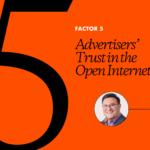Generative AI tools like ChatGPT aren’t just coming for people’s jobs — like programmers, copywriters, and graphic designers. They’re also primed to upend one of the biggest mainstays of the internet: search engines.
Naturally, that’s making publishers quite nervous.
Many publishers rely on search as one of their biggest referral sources. In fact, 35% of news publisher traffic comes from search engines — more than social channels and third-party sites.
So, what happens when that referral source is replaced by a generative AI tool? As PCMag posits, AI will replace search “sooner than you think.” And how can publishers prepare for a world without search?
Let’s take a look.
Wait, Will AI Really Replace Search?
It’s quite possible that AI will upend search as we know it.
While tools like ChatGPT may not actually search the internet for information like Google does, they can deliver rapid, personalized responses based on the data and information they’ve already been fed — like from Wikipedia and news articles. And that personalization could make all the difference.
As artificial intelligence professor Dr. Mark Lee said, “I suspect the next leading search engine will be one with the best AI and far more like a personal assistant than a search engine.”
In fact, Samsung has already programmed Bing’s AI chatbot onto its Galaxy devices. And Google recently launched Bard: an “experimental conversational AI service” that’s their answer to ChatGPT.
How Can Publishers Prepare?
If you’re used to relying heavily on search traffic, a world without search could be devastating. Not only might it make your numbers plummet, but you’ll also lose out on valuable data. If people will feed questions and concerns into AI tools, they might never make it to your site.
So, what’s the solution?
The obvious answer is to reduce reliance on search to drive traffic and build first-party data. But the question of how remains.
One major piece of the puzzle is community.
What do we mean by community? That publishers should build and nurture direct audience relationships. Create opportunities for people to engage natively on your site. Create a loyal community of readers and subscribers who you can rely on for steady visiting and growth. And use the data you generate directly from your website — like email addresses, comments, subscription preferences, and user behaviors and events — to learn about your readers and personalize experiences.
Right, your pageview count might take a hit. But that’s not the only indicator of success. To focus on loyalty and engagement, think quality over quantity — building relationships with attentive, returning users as opposed to driving one-off clicks.
Don’t Worry. We’ve Actually Seen This Before…
ChatGPT might be the shiny new tool on the block. But, for publishers, it’s actually just the latest iteration of the data-guzzling monoliths they’ve always been up against like Google and Meta.
So the good news is, we’ve encountered this obstacle before. And the even better news is, the solution remains the same: Focus on generating your own first-party data from your owned channels. After all, that information is coming to you unfiltered, directly from the source. It’s yours to analyze and activate. And no one can take it away from you.
Because shiny tools can come and go. But truly owning your data can help future-proof your business against today’s latest disruptor — and tomorrow’s.


